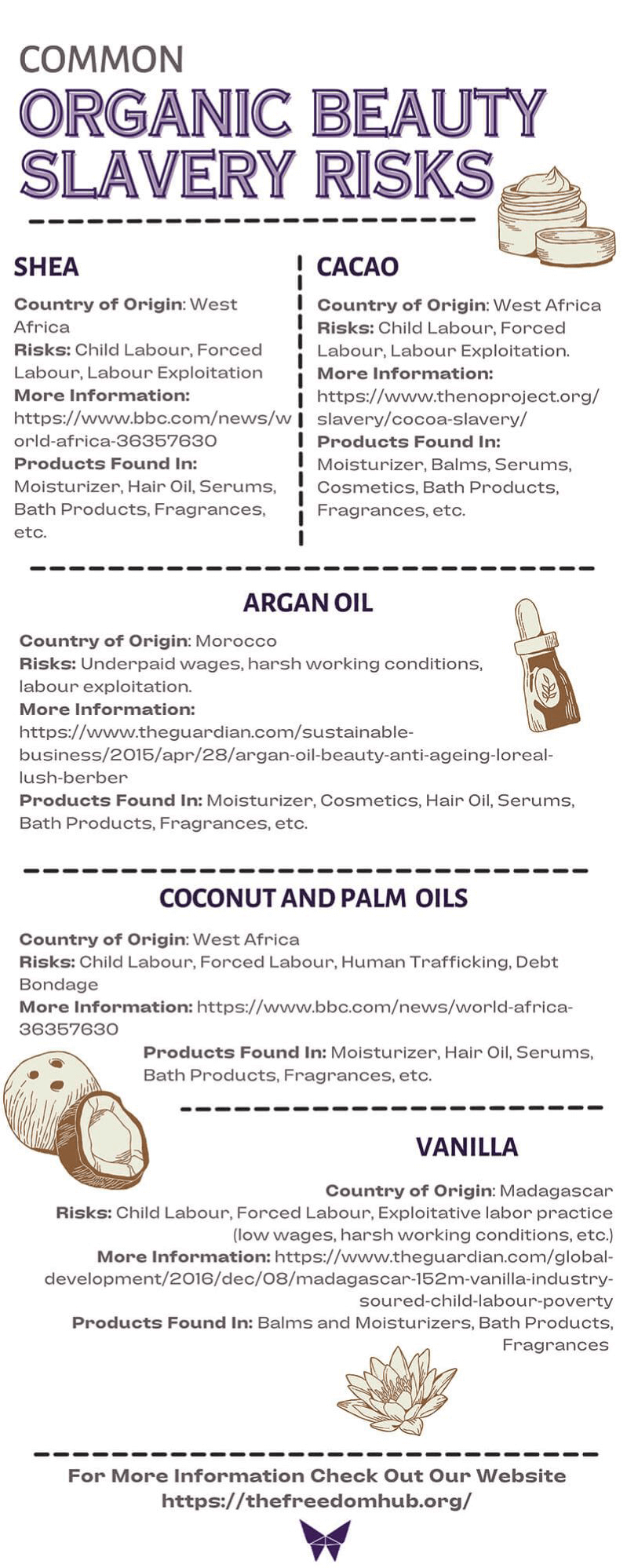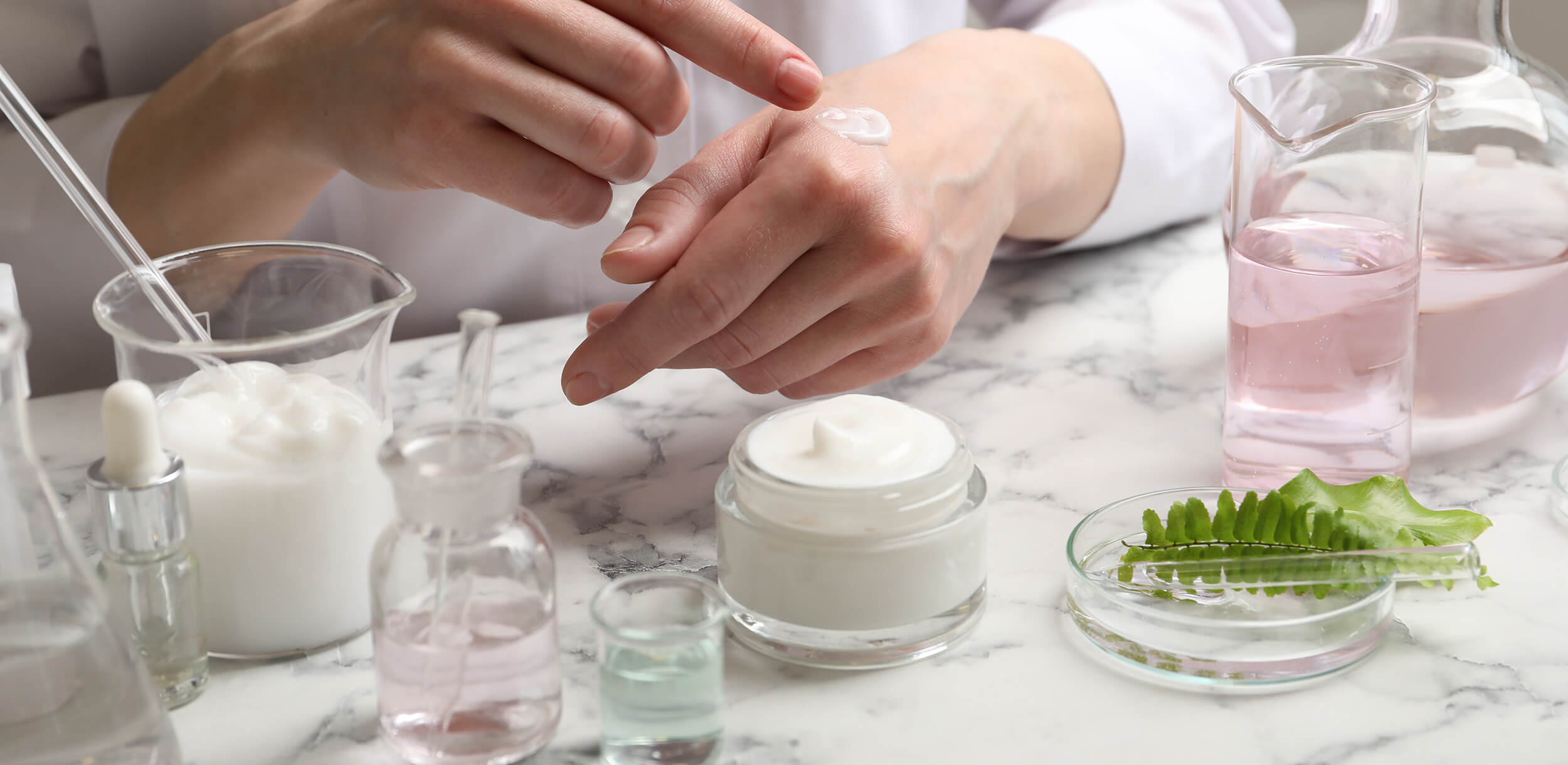When Organic Isn’t Ethical: The Slave Trade in the Beauty Industry
The Rise of Clean Beauty
“Clean” beauty products have taken the cosmetics industry by storm, and for good reason. The focus on using natural ingredients free of animal testing and harmful chemicals holds numerous positive implications, from better personal health to helping the environment. However, simply labelling a product as cruelty-free and/or organic doesn’t free it of the modern-day slavery risks from which sought-after naturally occurring ingredients are often sourced. Further, the secrecy behind cosmetic formulas on top of an already hard-to-trace supply chain industry, adds to the risk that your products may be linked to slavery, particularly those sourced from developing countries with weak labour laws and poor working conditions such as shea, cacao, and argon oil. Products containing these ingredients are often labelled organic and cruelty-free, but what does that mean?
Common naturally occurring ingredients include:
Common naturally occurring ingredients include:

What do the labels really mean? Is A Fair Trade Certification enough?
In Australia, some common certifications include Good Environmental Choice Australia, Australian Certified Organic or international certifications such as Ecocert, COSMOS or the Leaping Bunny (for cruelty-free products). However, clean beauty certifications generally focus on the safety and environmental impact of a product’s ingredients and production processes rather than on labor practices or social responsibility. Therefore, while these certifications may help to promote ethical and sustainable practices in the beauty industry, they may not necessarily address modern-day slavery risks directly.
In terms of helping companies avoid modern-day slavery risks, the Fairtrade Certification can be a useful tool. By obtaining certification, companies can demonstrate to consumers that they are committed to ethical and responsible business practices, including protecting workers’ rights and ensuring that their supply chains are free from forced labour and other forms of exploitation.
However, it does not guarantee that a product is completely free from modern-day slavery risks. While the certification process includes audits and assessments to ensure compliance with standards, there is always a risk that labour violations may occur in a company’s supply chain.
Why and how are modern-day slavery risks hard to detect?
- Lack of visibility and complexity of supply chains: Supply chains for beauty and cosmetics products can be complex, involving multiple intermediaries and spanning different countries and regions. This can make it difficult for companies to track the origin of raw materials and identify potential risks of modern-day slavery.
- Cost pressures and greed: The beauty industry is highly competitive, and companies may face pressure to keep costs low in order to remain competitive. This can lead to sourcing raw materials at the lowest possible cost by relying on suppliers who operate in countries with weak labour protections or regulatory oversight where labour abuses may be more common and easier to get away with.
- Lack of regulation: The beauty industry is not subject to the same level of regulation as other industries, such as food or textiles. This lack of regulation can make it easier for companies to ignore or overlook modern-day slavery risks in their supply chains.
Corporate Responsibility
To address these issues, it is important for companies to take a proactive approach to identify and mitigate modern-day slavery risks in their supply chains through measures such as conducting thorough due diligence on suppliers, implementing strong supplier codes of conduct, and engaging in regular monitoring and auditing to ensure compliance with labour and social standards. This includes:
- Companies should acknowledge the right of employees to join a union and refrain from any anti-union tactics that might undermine this right such as union busting.
- Ensure sustainability departments within a company are given proper direction and information regarding the activities of the company so they can make informed decisions.
Consumer Responsibility
Although it can be difficult to identify modern-day slavery risks that may be hidden deep within complex supply chains, there are some steps that consumers can take to try to make more informed choices:
- Research and reach out: If you’re unsure or concerned about the source of certain ingredients in a product, reach out to the company through social media and their website!
- Look for certifications: In Australia, certifications such as Fairtrade, Rainforest Alliance, and Azolla are designed to ensure that products are sourced ethically and sustainably.
- There are also specific certifications for ingredients commonly linked to slavery such as RSPO Certified Sustainable Palm Oil (CSPO).
- Look for products that carry these certifications on the packaging or check the product website for information about sourcing raw ingredients.
- Support ethical brands: Choose to support brands that are committed to responsible and ethical sourcing practices and have a transparent supply chain.
- When possible, shop locally and through small businesses that are knowledgeable about their supply chains.
- Spread awareness: Share information about modern-day slavery risks in the organic beauty/cosmetics industry with friends and family, and encourage them to also make informed choices.
References and More Information
Vanilla Risks:
Supply Chain Risks in Cosmetics:
Argan Oil Risks:
- The Scandal of Seamless Linkages: Global Value Chains and Women Argan Oil Producers in Morocco
- Argan oil: the cost of the beauty industry’s latest wonder ingredient
Coconut and Palm Oils Risks:
- Hidden slavery behind your weekly shop with kids as young as 6 sold for £210 & fishermen murdered by crews
- Palm oil labour abuses linked to the world’s top brands, banks
- What is coconut slavery?
- Why is copra a problem?
Cacao
Shea Butter Risks:
- Shea butter in Ghana: Hard labour for smooth skin
- Investigating the risk of child labour in the Shea value chain
Join our Community
Help raise awareness and join a local volunteer team, contact us here.
Or, if you would like to get our monthly update, opt-in here.
If you would like to support a survivor, donate here. (Tax-deductible)
Thank you for taking the time to read our blog – Material Traceability and Modern-Day Slavery (Please review it or share it with others.)




